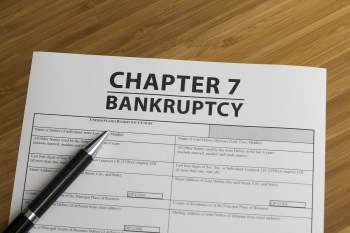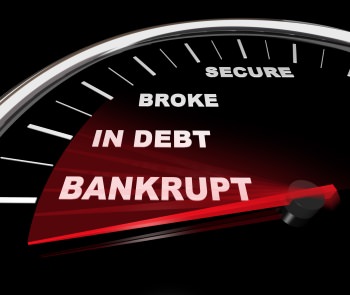We hear about bankruptcy all the time and often associate it with failure and poverty. It is something that everybody hopes to avoid, but there’s more to bankruptcy that just being broke and unable to pay your debts.
Quick Navigation
What is Bankruptcy?
Bankruptcy is a legal proceeding by which someone makes a petition at the court and declares their incapacity, by any means, to pay off current and outstanding debts. Through this legal process, you can find protection against creditors. You may also be given an option to pay only a small portion of your obligations.
While bankruptcy can help you get relief from your debts, you should realize that declaring bankruptcy can have adverse, long-term repercussion on your credit. Bankruptcy will reflect on your credit report for at least seven years.
In those years, you’ll have a hard time opening credit card accounts and getting approved for loans with decent interest rates. Moreover, filing for bankruptcy requires lots of preparation on your part. You’ll need to invest time, effort, and money in documentation and court proceedings.
In fact, it’s typically not easy to get your desired result without the input of an experienced bankruptcy lawyer. A bankruptcy lawyer can offer you professional help so you can get everything right in this complex legal proceeding.
What is the Goal of Bankruptcy?
The primary goal of bankruptcy is to allow debtors a way out of especially massive debts. With bankruptcy, individuals and businesses get a fresh start where all other options have failed.
According to a 1934 U.S. Supreme Court decision, bankruptcy provides the honest but unfortunate debtor with a new chance in life and a clear field for future prosperity, without the stress and hindrance of preexisting debt.
This goal is mainly achieved through the bankruptcy discharge. A bankruptcy discharge is the court order that releases you from personal liability for certain debts. It also forbids creditors or debt collection agencies from communicating with you.
Types of Bankruptcy
There are three main types of bankruptcy: Chapter 7 bankruptcy, Chapter 11 bankruptcy, and Chapter 13 bankruptcy.
Let’s take a detailed look at each:
Chapter 7 Bankruptcy
This is the most popular type of bankruptcy. It’s what many people think of when they are contemplating filing for bankruptcy. Chapter 7 bankruptcy is also called straight bankruptcy.
Under Chapter 7 bankruptcy, you are required to sell your nonexempt assets and turn over the proceeds to creditors. These assets may include cars, work-related equipment, and basic household furnishings.
After your creditors have received the proceeds of the sales, the balance of what you owe is eliminated once the bankruptcy is discharged. It’s worth noting that this type of bankruptcy won’t get you out of some kinds of debts.

You’re still required to pay court-ordered alimony and child support, student loans, and taxes. Chapter 7 bankruptcy has many consequences, including:
- You’re probably going to lose your assets
- The negative bankruptcy information will stay on your credit report for ten years after the filing date.
- If you get into debt again, you’ll have to wait for eight years to be able to file for Chapter 7 bankruptcy a second time.
Chapter 11 Bankruptcy
Chapter 11 Bankruptcy is generally for businesses and corporations that need to stay in business, but they can’t pay their debts. When a company files this type of bankruptcy, it remains in operation, but the expenses and revenues are overseen by a trustee who is tasked with the following:
- Protecting the business from creditors and preventing creditors from suing, freezing assets, and killing the business.
- Protecting the creditors to ensure they are paid fairly and that the business owners don’t disappear with the revenue without paying creditors.
Chapter 13 Bankruptcy
Chapter 13 bankruptcy allows you to keep your assets, provided you commit to partially or wholly repay your debts. Your attorney and the bankruptcy court will negotiate a three-to-five-year repayment plan.
You may commit to repay all or part of your debt throughout that period depending on what you’ve negotiated. Once you’ve completed repaying the debts as agreed, your debt is discharged.
The discharge will apply even if you only managed to repay part of your original debt amount. This type of bankruptcy will also hurt your credit score.
Nonetheless, it would be a fairer option if you are to choose one of the three types of bankruptcy, because you may be able to keep some of your property once you partially or fully repay your debt. In addition, Chapter 13 bankruptcy cycles off your credit report after seven years, and you can file again for bankruptcy under this chapter after at least two years.
Who Should File for Bankruptcy?
Wondering if bankruptcy is the right move for you? The following questions will help you determine if you are a candidate for bankruptcy:
- Are you thinking of consolidating your debts?
- Do you use credit cards to pay for essentials?
- Do you only make minimum payments on your credit cards?
- Do you get scared when you think of getting your finances together?
- Are bill collecting agencies calling you?
- Are you unsure how much you actually owe?
If you answered on the affirmative to at least two of the questions above, you could be on the brink of bankruptcy. Remember that bankruptcy is when you owe more than you can afford to pay. To evaluate your financial situation, make a list of all your liquid assets.
Remember to include your retirement funds, real estate, bonds, stocks, cars, college savings accounts, and other non-bank funds. Sum up all of them. Next, sum up all your bills and credit statements.
If you find that the value of your assets is less than what you owe, then you should consider filing for bankruptcy to get out of that financial quagmire. Studies have shown that medical debt and job loss are the two primary reasons for considering bankruptcy.

Health issues can make it difficult to engage in gainful activities. You may end up quitting your job or getting fired by your employer due to being nonproductive.
It’s a tragic situation because you lose your job at the same time your expenses increase. There are several other situations, albeit minor, that may cause you to contemplate filing for bankruptcy.
They include the following:
- Creditors are suing you for defaulting on your payments
- You are getting a divorce
- You can only pay for items using a credit card
- Your home is underwater and is at risk of foreclosure
- You are using one credit card to pay off another
- You’re thinking of withdrawing money from your 401(k) account to pay bills
Nonetheless, you need to approach bankruptcy with care. It is not a simple process, and it may not get you out of debt. You should engage a reputable bankruptcy attorney to advise you on whether it is a right move for you.
In Conclusion
Don’t allow the fear of your debt to take over your life. By learning how bankruptcy works and how it can help you keep your debt under control, you may discover one avenue to obtain a fresh financial start.
Of course, it’s also a step that should only be taken with careful consideration. Before choosing bankruptcy, you should try other options like credit repair or speaking to a financial counselor.

Leave a Reply